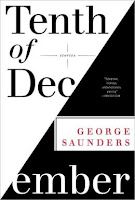What kind of short stories do you like?
Do you like experimental stories, in which the author doesn't necessarily adhere to traditional narrative structure, explores ideas and concepts you may never have imagined, sometimes imagining a not-too-distant time where things will be vastly different than you're used to? Or do you prefer your short stories to be more traditional in terms of narrative, characterization, dialogue, and concept?
If you're a fan of the former, George Saunders' new collection, Tenth of December, is definitely one you should explore. And if you're more a fan of the latter, while all of Saunders' stories might not quite resonate for you, there are still some brilliantly written stories worth reading.
Saunders is probably one of the most creative literary minds currently writing. He explores ideas of class, race, sex, relationships, love, in a way I've never seen, and many of his previous novels and story collections have tended toward the satirical. The stories in Tenth of December aren't quite as satirical, but their approach is far from what you see in most collections today.
The stories that I enjoyed the most included Victory Lap, which chronicled a young girl's attempted kidnapping through the eyes of her next door neighbor, a teenage boy so controlled by his smothering parents he isn't sure whether to help her; Puppy, in which a harried mother takes her children to get a dog, but discovers more than she wants to about the woman selling it; My Chivalric Fiasco, detailing personal drama within a renaissance fair-like setting; and the powerful title story, in which a man with terminal cancer goes into the woods to die, but finds more than he bargained for in a troubled young boy.
Admittedly, I'm not much of a fan of so-called experimental stories, so I didn't quite "get" all of the stories in this collection. Some of the stories are a little vaguer than I would have liked them to be (one whole story kept referring to a term and never actually defined what the term was, although you could extrapolate its meaning somewhat, it really bothered me), and in some, characters were either so unsympathetic or spoke with weird affectations that I found it difficult to get into the stories. (Several stories referred to futuristic drugs or products with trade names, without ever quite explaining what they were or how they were used.)
This collection has received tremendous critical and popular acclaim, and you can see why, as Saunders is at the top of his game with his storytelling ability. These are not mostly happy stories, but they are powerful ones, so if you're prepared for that coming in, you may be able to take more of them into your heart and your mind.

No comments:
Post a Comment